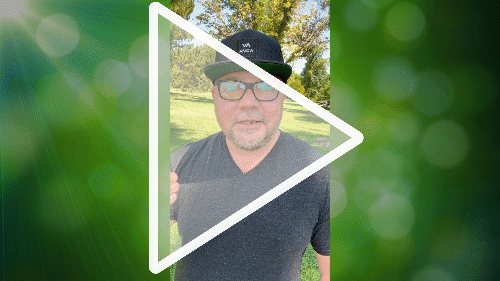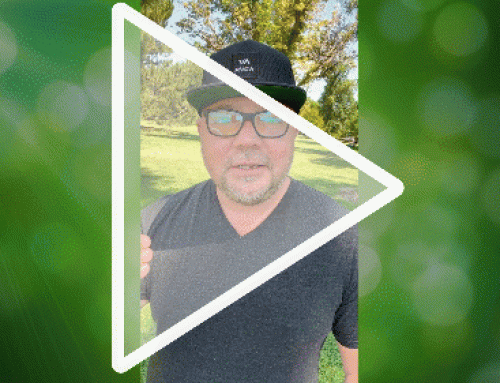“We often miss opportunity because it’s dressed in overalls
and looks like work”
– Thomas A. Edison
TRANSCRIPTION OF THE VIDEO:
Dave Crumby (00:03):
Hello everyone! Welcome to our first Getting Real series where we’re just gonna go a little bit deeper. And today I have Michael Thorne and it is an honor. Michael is a 20-year industry veteran, probably more…
Michael Thorne (00:23):
30, next summer!
Dave Crumby (00:27):
He’s been one of Inman News 100 Most Influential People. He’s known throughout North America. Just an amazing guy who has a wonderful business. But, most of all, why he’s here is he is just a good human. So I want to go deep with Michael and just listen in awe. To set the stage, we’re entering this new season–a normalization of the real estate market–and it seems that we’re entering a year where there’s likely going to be significant transaction velocity reductions. I’ve seen anywhere on reports of Goldman Sachs saying the US may be in the 4.3 million range, down from 6 million. So, that is a shift and a market shift doesn’t necessarily mean that you can’t have your best year ever. And you being in the industry for 29 years, you’ve been through these seasons, you’ve been through recessions and market shifts. How have you fared?
Michael Thorne (01:33):
Well, that’s a great question. In 2009–which was the biggest of the little dips that we’ve had over the years up until that point to 2009–was our best year we’d had up until that point. And going into the fall of 2008, and obviously up here in Canada, we didn’t get hit as hard as south of the border, but there was an agent in my office who was very excited about 2009. And he was a very seasoned veteran. He had gone through ’81 and ’82 and I pulled him aside and I said, “Why are you so optimistic?” And he says, “Because new opportunities are gonna present themselves and the office generally.”
And I think the industry right now is–oh, these are not good times–but it has opportunities. And 2009 was our best year up until that point because we were able to identify opportunities that presented themselves in 2008 and 2009, that hadn’t presented themselves in quite some time.
(02:45):
And if you’re able to identify those opportunities… in that case, it was buyers. And I think we’re probably moving towards buyers right now. The opportunity was for first-time home buyers to get into the market, because we knew that the swing would come back. You know, housing demands are going to come back, populations are going to grow. And if you can identify the opportunity, it is your job to articulate that opportunity to the general public in a mass wave, if that’s via video or whatnot. And then also one-on-one to reach out to people in your sphere, kids of past clients, etc. and say, “Here’s an opportunity!” and then help guide those people through that process. I think we’re right there right now. I think buyers have been on the sidelines generally for the past seven years as the market ran away from them.
(03:41):
And now they’re being presented with an opportunity that hasn’t presented itself for quite some time. It is our job as agents to guide these buyers through the process so that they can win long term. And, there are a lot of people that fundamentally changed their future when they got into the market in 2009. And then we saw the rebound and it will come back. I always go back when I talk to people… my grandfather paid $9,000 for his first home, my mom and dad paid $27,500, and I myself paid $163,500. My son, who’s 16, will buy an apartment for $700,000 – $800,000. That’s the way it will go. And so we need to identify and then articulate to the right audience.
Dave Crumby (04:31):
That’s interesting. What I’m picking up on a current underneath the surface is when seasons like this come, how you’re going to do depends on your mindset because you’re labeling this as an opportunity. A lot of people in our industry can just get real tactical, which is a more fear-based reaction, but you’re approaching this with a completely different idea and it’s positive!
Michael Thorne (05:02):
And it’s just not the real estate market. It’s anything. Its the early adoption on a lot of technology that our team has had, where we see opportunity. That’s just the way it is. And unfortunately, much of our industry (and I) think a lot of people will not change to keep up. So, they’ll still make some changes so that they don’t fall behind, but they never get the opportunity. The opportunity was taken by the people that changed early, adopted early, or articulated opportunity early. And then when the last people make the change it’s so that they don’t get left behind, But they never ever win for their change. And so we’ve been paperless since the early two thousands, and that has made our customer experience great over the past two decades.
(06:07):
There’s a lot of people that during COVID adopted a paperless way of doing business so that they could stay in business. Not so they could win business… so they could stay in business. But they still had to do the same change we made. We just made it early. And that’s the same thing that will happen now. People will be able to articulate and educate. That’s a big part of it. That’s a thing that our industry doesn’t love to do. And, I don’t know why we don’t educate transparently to the public so they know every one of the ins and outs… so that they are wise and then they can make the change. I believe it’s about education. I think a highly educated buyer and seller who knows everything that can go right AND everything that can go wrong in a transaction–a highly educated consumer–is then more likely to use an agent than not use an agent.
(07:02):
So the fear of educating the consumer shouldn’t be there, but we have this fear. I think a highly-educated consumer that will use an agent is better able to identify the difference between a good agent and a great agent, right? So a highly educated public benefits great agents more than anyone else, yet we have in our industry this fear of what happens if the public knows as much as we do about the transaction? But, as agents, we do this hundreds of times a year. Our job is to guide people through the process, not to keep them in the dark, but to guide them through the process to say, “Hey, this obstacle is about to present itself or this opportunity’s about to present itself, but having an educated consumer is not a problem,
Dave Crumby (07:55):
Right? You’re bringing up something that I didn’t plan on bringing up. I’ve read statistics by NAR upwards of, I think 75% to 85% of home buyers and sellers, when interviewed post transaction, said they would use that agent again if they had a good relationship with them. They were happy with the experience yet our industry seems to get a black eye at times. And you said something so important: we need to be deliberate about being kinder to one another. And I’d love to hear your ideas on that. Cause that’s coming from a lot of wisdom.
Michael Thorne (08:34):
You mean between agents?
Dave Crumby (08:36):
Yes, between agents.
Michael Thorne (08:37):
I have this question, a little rapid-fire round at the end of my podcast. “If there’s one thing you could change about the real estate industry, what would you change?” And we get all these different answers. And while I was writing out the questions for the rapid-fire round, I wondered how would I answer it? And, and this is how: I wish we were publicly able to praise each other more to the public. I wish we were able to say great things about each other publicly, because when Realtors say things publicly about other Realtors, it’s usually a negative thing that we’re saying, it’s a bitter point. We don’t mind saying something bad about another Realtor, because then if the public knows that that Realtor’s not that great of a Realtor, they’re more likely to use me.
(09:30):
But what we don’t do is stand on a soapbox in the middle of our hometown and say, “She’s awesome to work with!” or “He’s super professional!” or “His marketing is incredible! or “He’s super ethical.” We don’t praise the people in our industry that we love working with because we fear that it means that someone who might have used us will go use them because I’ve endorsed that particular person. But we all know those agents that we work with when we get an offer coming in and we see the name of the top of the sheet, we go, oh, this is gonna go well, I can’t wait to work with her, or do a deal with him. And that’s the one thing I wish we could do now. I can praise Realtors in Denver and in Toronto and Winnipeg all day long because I don’t have that fear. But the people hearing me praise them aren’t in Winnipeg, aren’t in Toronto, and aren’t in Denver, so it really doesn’t impact the industry the same way. I just wish we could say how awesome we are, because I believe this in our industry. Real estate agents are some of the best human beings, they have these amazing intentions, they’re empathetic, they care about their clients, and they’re amazing! But we just don’t say that enough.
Dave Crumby (10:51):
Right. You brought up an important word on why we don’t do that. And that’s FEAR. So I have read a lot about how to get better at LIFE. And I’m a big believer that if you get the day right, then the ingredients of every day, the weeks, months, years take care of themselves. How do you approach your days?
Michael Thorne (11:26):
We are talking about my excitement. As I’m getting older, I try to get up earlier than the rest of the family. Especially during school times. My amazing wife is a teacher with two kids in high school now. And I try to have 15 minutes of silence with a cup of coffee. I love being quiet. I think it’s really, really important to be quiet. Then, I get the kids off to school and my wife goes off to work. And then I get out for a walk with the dog and that’s probably my most creative time. That’s where ideas come up. I try to embrace boredom or silence as much as I possibly can. I think that’s really, really important. So I try to get out there. I might listen to a podcast if there’s something I really wanna listen to, but if not, I try to be quiet. And a 45-minute walk with a dog and then off to the office where we spend from 10 till noon with a team. And then we look at the day and go from there.
Dave Crumby (12:40):
That is amazing! So refreshing just to get that slow start rather than just get thrown into busyness all day. We often get lost. And my thesis is we have such a distorted view of what success is in this industry, that it clutters our minds. It distracts us from what is really important. The reality is everyone has their own definition of success. What is happiness and meaningful to one person is going to be different to another. Why are we there? How do we fix it? What is success?
Michael Thorne (13:26):
Yeah, I talk about this as much as I possibly can. I’ve been blessed to go all over North America and Europe to speak on stages. If I were to build a new keynote and really tour it around, it would be on this topic, unfortunately. And I don’t really blame the industry, but it’s unfortunate that we have one matrix for success in our industry. It’s been that way since the early nineties and I don’t see it changing anytime soon. It’s money. That’s how we judge success. That’s where the awards come from. That it’s the deals closed. Money’s made. Here’s your big trophy. That’s what success is. And there are so many amazing agents that are providing a great income and raising a great family, saving up for college, donating their time at charities, being at every baseball game for their kid, being at every dance recital, and they’re making $140,000 a year.
(14:35):
And I think they are enormously successful human beings. I just think they’re really, really successful. I’ve got a number of awards, or my team’s got a number of awards, but the awards that I cherish the most are the service awards that I’ve gotten–the awards for recognition for giving back to my brokerage or giving back to the industry or education awards. Those sort of things mean way more to me than the dollar volumes. And so what we have to do as individual people, in my opinion is define what your success is. And that really comes back to why are you doing this? Even if it wasn’t real estate, if it was something else, what would make you a successful human being? And once you figure out what your definition of success is, then your job is to pursue that with reckless abandonment. Go after whatever that success is.
(15:29):
And I’m right in the middle, you know. I’ve got a 16-year-old kid that’s thinking about architecture and all these things. And he sees people with nice sneakers and that sort of stuff. And I said, “Carter, $350,000 a year and miserable, or a hundred thousand dollars a year and happy? If every day you go out to work and you make a hundred thousand dollars a year, and it’s something you love to do, and you’re a happy human being, you’re far more successful than somebody else who’s making $350,000. It is.”
And so my definition of success, because I’ve learned it the hard way going through about three years of a very bad depression after a car accident is, success for me, is the number of hours in a day that I’m happy. That’s it? I love that because nothing else matters.
(16:18):
Yeah, to me, it’s happiness. And sometimes when we get into this industry and we’re working with a client, it’s super frustrating when they don’t value our value. If someone doesn’t see the value you provide, walk away from that client. Because you could be spending it with someone else, or you could be at home with your kid throwing the football, or you could be reading a book. Be happy. And, you know, it’s taken some time to get there, but we do need to start to define our own happiness. And I think brokerages have gotten very good at this. My brokerage is trying to identify what success is for each agent and pushing them towards it. So if they know that that their agent is, “I wanna close 150 deals a year,” they’ll really help push that client to that goal.
(17:08):
If another agent’s goal is this balance, you know, they love when they come into the office at noon because they went out on an early morning round of golf. Hey, did you enjoy the round? That’s, you know, to reinforce that that’s a great brokerage and cultures become much more important in our industry. I think people have got success all wrong, and I don’t know what the industry can do about it because I don’t know how you gauge rewarding charity work and success and client care. If you work with eight people a year and close eight deals and your clients think that you’re the greatest thing since sliced bread, my goodness, you’re doing such a great service for our industry. You know what I mean? You’re doing such a great service, but if you’re closing 300 deals a year, and then your client thinks that they were treated just like a number, you’re not doing a service for our industry, you know? And I don’t think everyone has to give back to the industry. I don’t think that’s a prerequisite. I believe I need to give back to the industry because it’s provided me an amazing life.
Dave Crumby (18:17):
Michael, in getting to know you I’ve kinda learned what makes you happy. You genuinely get joy and fulfillment from helping people and when it comes down to the formula for success in our industry, it really comes down to a collection of authentic individual relationships.
Michael Thorne (18:45):
Yes.
Dave Crumby (18:46):
So let’s say that you have a brand new agent that is gonna come on your team cause you don’t do a lot of lead generation. It sounds like the bulk of your business is built upon referral relationships, on repeat clients. Building and maintaining a relationship for someone like you becomes natural, because you’re you, but I’m sure you had to work on that at some point. So if you were to teach someone how you build that trust and maintain it over years, pass a transaction, what do you do? What are the pillars of that?
Michael Thorne (19:25):
Yeah, That’s a good point. I don’t think I’ve ever really broken it down to what are the elements of a relationship. I just think, you know, when you’ve got a good one, I think anytime a relationship is really under the guise of what can you do for me then that’s when that relationship’s on rocky ground. If there’s one good thing that has come out of social media, it’s our BS reader and our BS radars are off the chart. I think if you come from a genuine place when you check in with past clients to like, “Hey, how are you doing? How are the kids? And you really are genuinely interested in their kids and generally giving them an update on something that’s changed in the industry–opposed to just an excuse to call them so they can help you grow your business.
(20:21):
Right? I think people just absolutely sense that. And the other nice thing about social media or just in our lives, we know a lot of triggers about our clients. If you never post on social media, you’ll be happy. But if you go online and you see your past client’s son just graduated college and he was a valedictorian, you know, stop and open up your phone, send a BombBomb: “Hey Tom and Mary, I just saw that Eric graduated university. You guys must be so proud. I remember when he was like seven years old, when you guys bought your first home. Congratulations, that’s a great deal! Please pass that on to Eric.”
That’s all you have to do.
Dave Crumby (21:08):
Right? I’m so glad you broke it down to that simplicity. We study relationships a lot with Realvolve and really try and exhibit what their database of relationships is worth. You know, all relationships go from a phase of when you first meet of awareness. You know, like trust. So you brought up such an important point because once you’re in a transaction and you close a transaction and help someone buy and sell a home, they trust you. But then that relationship drops off because the agent goes back to chase more leads. But all they have to do is call and ask how they’re doing. We have trust, but just keep it. They’re so simple.
Michael Thorne (21:52):
It’s so simple. It’s like getting a car up to a hundred kilometers an hour, once it’s cruising.
Dave Crumby (21:58):
I’m American. We don’t know what that is 🙂
Michael Thorne (21:59):
Okay. 60 miles an hour, once you get up 60 miles an hour on a flat highway, it’s not using the same fuel as it took to get up to speed. Right? I mean, it’s really cruising. A hybrid car is not as efficient on the highway as a gas car, but in town with stop-and-go traffic, that’s when a hybrid really does the heavy lifting.
Earning trust is so difficult. But once you have it, maintaining it is the easy part. Especially from a past client who you’ve demonstrated your abilities to successfully do what you said you were going to do. By definition, a past client means you did your job. Right?
Dave Crumby (23:04):
Right.
Michael Thorne (23:04):
Did your job and now you’ve demonstrated your succes to somebody who has coworkers and friends and children and relatives. Right?
Dave Crumby (23:19):
Right.
Michael Thorne (23:20):
Maintaining that trust is so simple. Why would you want to go back and take a perfect stranger and try to get through all that process to walk away again? And this is where we have it made in the shade in North America compared to a lot of the rest of the industry around the world. I hate to say that word, but our ‘product’ is the client, right? When you are only the listing agent and you don’t represent the buyer in Europe, Australia or around the world, your product is the home. And the moment you successfully help Tom and Mary sell their home and they go off to buy another home, you say, “Goodbye Tom and Mary, good luck.” They’re gonna go find a new agent and they’re gonna do a deal without me. And therefore that relationship isn’t maintained, right?
(24:13):
But if you in North America, you know that even a client that’s not gonna sell for 15 years is a raving fan of yours. And that’s a huge point. Create raving fans. They know people that they care about who had a good experience with you. Maintaining a relationship is so much easier than creating a relationship. Look at us as older men. If there’s one thing, older men have a problem with finding new buddies to hang out with. Right? The friends you were with in college, you know that’s easy to maintain that relationship because you have history. But it’s hard to go out as a 50-year-old and meet a new buddy and become best buddies and play poker together. It’s difficult. Right?
Dave Crumby (24:57):
Yep.
Michael Thorne (24:58):
Once you have that relationship, maintaining it is so easy.
Dave Crumby (25:01):
Yep. I wish that everyone knew this secret and the truth about our industry, which really pushes leads a lot. And we do the same. You know, you need that balance. We do that with Firepoint, but if you have an authentic relationship with 3 to 500 people who know, like, and trust you as a real estate professional, you’ll do 30 to 50 transactions a year from that group, like clockwork.
Michael Thorne (25:31):
And, and here’s the magic about that, Dave. So we have these client gatherings, you know, we’ll have a client party or whatnot, and Jordan, Trish, and I try to find three minutes to sit back at these events and just take in our client base. You know, like really intentionally stand back and just look at them, talking to each other and laughing and eating and you know, and they all look like each other. And I don’t mean physically look like each other. I mean, they’re the same type of human being. And one of the great things about those people is that if you have a database sending you new business, they’re sending them. They’re usually sending you people like them. Their friends are like them. They have the same priorities. They have the same values. They have the same, all that sort of thing. They have the same structure.
(26:22):
And so when you get a new lead, you don’t know if they’re high maintenance or low, you know what I mean? You don’t know who they are, but when your friend recommends their best buddy, man, that’s so much fun to do work with people that are mirror images of the people you like doing business with. And that’s really rewarding because that makes your job better. And one of the great things about where we are with media now, if you don’t like my personality–we hug our clients all the time–and especially at the end of the process. If you don’t wanna be hugged, you better not work with us. And we’re okay with that happening because I want to have people that are huggy people. That’s the type of client I wanna work with. And that’s okay that if you go, “Michael’s not for me.”
(27:10):
Great. Because it’s Newton’s law … you know for every action there’s an opposite reaction. If you demonstrate publicly who you are and that alienates a certain amount of the marketplace, that only means you’re pulling a certain amount of the marketplace towards you. And I think as agents, we try to be this vanilla. We try to be kind of interesting to everybody, as opposed to super interesting to some people, not everyone, but some people, and that’s all we need. As you say, 400 past clients. We go through our database at Realvolve and we look right now at around 627 A’s that are trust, you know, A’s and trust. And we just go, that’s amazing. Like that’s our business.
Dave Crumby (27:53):
Yep. there’s a lot of noise in our industry. Agents get distracted. There is this never-ending parade of new tech, AI whatever it is. Yeah. Have we reached peak tech to be able to accomplish our goals? I think agents are firmly planted into transactions, at least for a decade or two. We are essential. We help build communities. So does the tech matter? I know you’re a Realvolve customer, but how do agents turn off that distraction from new this, new that, you know, there’s a squirrel…
Michael Thorne (28:37):
Yeah. I think tech is extremely important in our business,.. in our industry. I think it is so important to have an amazing tech stack that works for you, but primarily reduces friction for your consumer. That’s where all tech should be: reduction of friction. For my client, if it reduces friction for my client and reduces friction for me, even better. If it’s a zero-sum gain for me, but reduces for them, great! And even if it creates a little friction inside the team, but reduces friction for the consumer, I’m all for that. The big tech switches in 1995, … agents in my office quit when we got a fax machine, because it was such an enormous change when there wasn’t change prior. So anytime we have a long period of no change, any change that comes along gets magnified, it seems so much bigger than it actually is.
(29:42):
The adoption of tech that we’ve seen in the last 10, 15 years has been absolutely crucial to the success of a real estate agent. However, I think we’re at a point now where if you’re constantly looking for that silver bullet to come along, that’s gonna radically change our industry. It already exists right now. I’m not saying that’s not gonna change in the future. I’m not that way, but the tools that we require to be successful now are plenty. They’re good. And they’re available for us. And so video, which I’m a big believer in isn’t a fad or a trend because it’s been around since 1900. It’s just accessible to us for the first time, right? And so when it comes to great CRM, video, paperless, all these things they’re here.
(30:41):
Now, I believe any new tech that comes along will be an iteration or an adjustment on something that already exists. I think our next big leap in our industry will be mass adoption of Virtual Reality and Augmented Reality. That’s probably where the next one is. TikTok is the biggest social media platform to come along in the last 10 years and it is an iteration of Vine… it’s not a new invention, it’s just a twist on it. And I think that’s what we’ll get, we’ll get twists on certain things. We’ll get addons to our CRM. YouTube introduced YouTube shorts, but it’s still YouTube, right? I just really think we’re there now. So I think we want magical leads to come along that will convert in 15 minutes. No, there’s no secret.
(31:35):
There’s no magic weight loss. You know, you gotta put in the work. There’s no get-rich-quick scheme that works. It’s about doing the work that’s important to you to get you to where your definition of success is. But I think all the tech we need out there is finally here. We’re still waiting for a lot of the industry to catch up. But I think we have it in front of us. And so start implementing, start really using the tech that you have. I mean really dig into it, make sure you spend the time onboarding the tech and then have it work for you in a really meaningful way. That’s where I think we are with tech,
Dave Crumby (32:16):
Michael, Thank you. You’re one of my favorite human beings. Thank you for sharing your wisdom with everyone. Where can people learn more about you and just have a chance to get to know you?
Michael Thorne (32:28):
I’m pretty easy to find. My mode of communication generally is Facebook Messenger. You can find me there pretty easily. We’ve launched a great podcast. Dave, as you know, about three or four months ago called the Real Estate Coffee House where we sit down just like this, but I’m on the opposite side. And I just talk to really great humans about the industry. And there are always those one or two little nuggets that appear, and that’s all you need in your business to make big changes… a little idea here, a little tactic there. That’s what we try to do. So yeah. If anyone wants to reach out and say, HI, I love talking real estate.
Visit Michael Thorne at his website here
—————————————
I hope you have a great week!
Dave Crumby
CEO | Firepoint & Realvolve
PS – We’re still gathering noteworthy entries for our new book of real estate agents and team success stories. Please reach out to me if you have a success you’d like to share.





